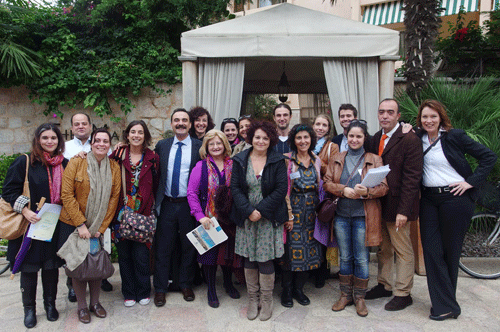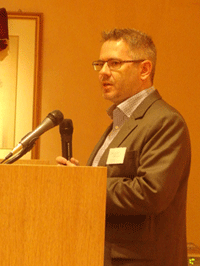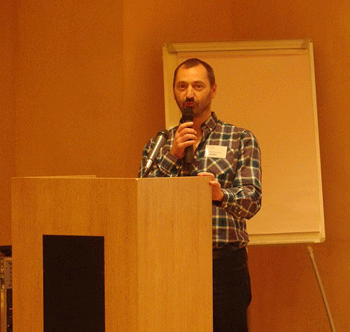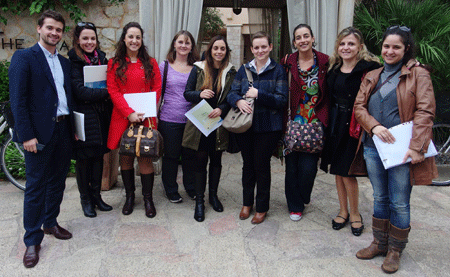The objective of this seminar was for the participants to learn more about the legal framework and to discuss methods and practice for identifying vulnerable groups of asylum seekers.

Programme 1 under the EEA grants to Greece shall address urgent needs for the reception and screening of new arrivals and for the accommodation of vulnerable groups. How to identify vulnerable groups is a key issue in order to reach this goal, and a highly relevant theme in both Greece and Norway.
Norwegian Ambassador to Greece, Mr Sjur Larsen, held the official opening speech, and welcomed all the participants and organisers to the seminar. Following the opening remarks Ms Vigdis Vevstad presented the international legal framework with an emphasis on the Reception Conditions Directive. Mr Vevstad performed an in-depth analysis of some of the provisions in the Reception Conditions Directive and made qualified comparisons between practices in Norway and in the EU.
After Ms Vevstad's general introduction to the topic, the audience was presented to Greek practices on the field. First representative from Greece was Mr Panagiotis Nikas, Director of the First Reception Service, who spoke about the challenges the Greek Reception and Asylum systems have to overcome, but also the achievements made since the implementation of the new system. His presentation was followed by Ms Kalliopi Chaziri from Medical Intervention who presented the organisation and their activities in the First Reception Centre at Fylakio.
Mr Christos Dimopoulos from EKKA provided the audience with statistics and practical examples that illustrated some of the challenges EKKA, being the state actor with responsibility for referral of asylum seekers to reception centres, have to deal with on a day-to-day basis.
Mrs Marit Sjaastad from the Norwegian Directorate of Immigration and Mr Vegard Nore from the Norwegian Directorate of Health presented the main challenges in Norway identifying vulnerable persons with special needs. Mrs Sjaastad gave a short introduction to the general migration and reception system in Norway, while Mr Nore talked about the challenge of sector legislation. Mr Nore also presented the pilot project in Norway, being implemented in the arrival centre for asylum seekers in order to find a more systematic method to identify and follow up vulnerable persons with special needs.
After lunch, the participants had the pleasure to be addressed by Secretary General for Welfare, Ministry of Labour, Social Security and Welfare, Ms Efi Bekou, who thanked the organisers for the initiative to have a seminar and stressed that the Ministry of Labour, Social Security and Welfare is engaged to find durable solutions for vulnerable persons.
The observations and remarks of Mr Geert Knockaert, Fedasil (the Belgian Federal Agency for the Reception of Asylum Seekers) offered useful information from Belgium which is considered to be one of the countries that has developed good practice regarding the identification and follow up of vulnerable groups. Mr Knockaert gave a general introduction to how the field of asylum and migration is organised in Belgium, some key figures and a general overview of the reception system. He then explained the reception chain and the guidance path.
Ending day one of the seminar, IOM Greece, represented by Maggi Lazardi and UNHCR Greece, represented by Daphne Kapetanaki, were invited to give their comments and views related to the information shared during the day. UNHCR referred to the generally difficult situation for migrants in Greece and urged the players within the asylum and migration fields, including the relevant state agencies, to have better coordination.
During day two of the seminar the participants were introduced to three specific topics.
Mrs Erna Blondal, Ministry of Interior, Iceland started day two with an in depth introduction to the legal framework on the identification of victims of torture and how to follow up the Istanbul Protocol. Her presentation was followed up by Mr Kenneth Brant Hansen, Head of Program Unit, Greek Council for Refugees. Brant Hansen gave a presentation of the work being done through the project "Prometheus: Identification and Rehabilitation of Victims of Torture in Greece", the project Babel runs jointly with the Greek Council for Refugees.

The second topic of the day was the importance of communication and interdisciplinary cooperation. Mr Knockaert from Belgium, Mr Nore from Norway and Ms Lamprini Zoi from Ministry of Labour, Social Security and Welfare gave their introductory remarks and the floor was opened for a fruitful discussion.

Ms Bente Aavik Skarprud, Head of Special Unit for Children, UDI and Ms Anne Sofie Døskeland, Senior Adviser, Asylum Department, UDI had the pleasure to hold the last presentation of the seminar, dealing with one specific group of vulnerable asylum seekers, namely children. Ms Skarprud and Ms Døskeland explained the asylum process of unaccompanied minors in Norway, including how the responsibility is organized in the Directorate of Immigration. They also explained how the Directorate carries out interviews of unaccompanied minors, and presented the Norwegian method for age assessments and the scheme of legal guardians.
During the seminar, representatives from a wide range of NGOs, international organisations, but also state agents, were able to share their experience and expertise. In addition to the planned presentations there was also adequate time for the participants to discuss in plenary on an extensive range of subjects.

Downloads
- Ms Vigdis Vevstad, European Developments with Emphasis on Reception Conditions for Vulnerable Asylum Seekers (pdf, 104 kB)
- Ms Kalliopi Chaziri, Medical Intervention (pdf, 2,6 MB)
- Mr Christos Dimopoulos, EKKA (pdf, 426 kB)
- Ms Marit Sjaastad, Identification of Vulnerable Persons, UDI (pdf, 455 kB)
- Mr Vegard Nore, Identification of Vulnerable Persons, Norwegian Directorate of Health (pdf, 141 kB)
- Mr Geert Knockaert, Identification and follow-up of asylum seekers with special needs in the Reception System in Belgium, part 1 (pdf, 1,8 MB)
- Mr Geert Knockaert, Identification and follow-up of asylum seekers with special needs in the Reception System in Belgium, part 2 (pdf, 339 kB)
- Ms Erna Blondal, Identification of victims of torture, how to follow up the Istanbul Protocol (presentation not available)
- Ms Bente Aavik Skarprud and Ms Anne Sofie Døskeland, UDI, Minors in the Norwegian Asylum Procedure (pdf, 172 kB)
- The programme (pdf, 43 kB)
- The invitation (pdf, 54 kB)
- Participant list (pdf, 87 kB)
